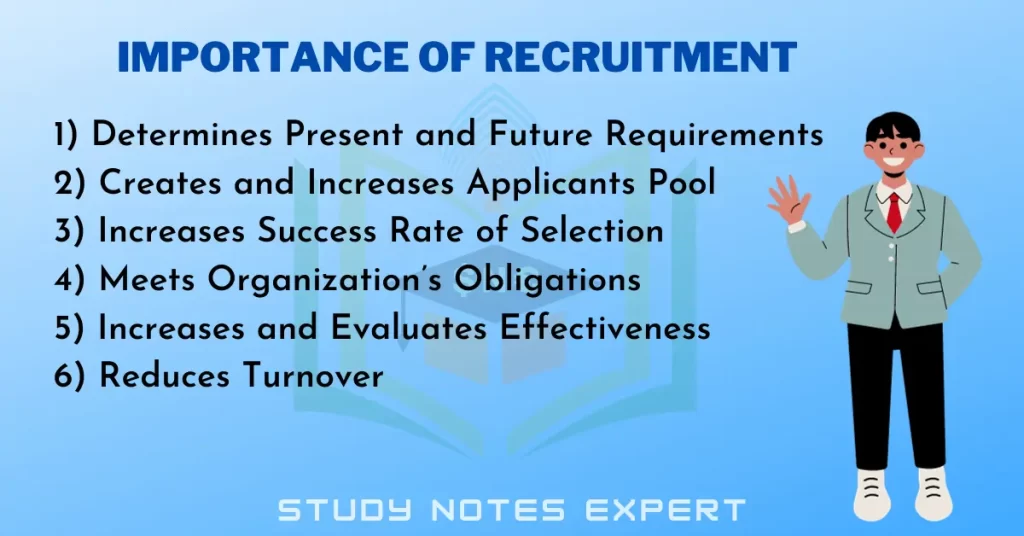The process of recruitment is one of the most significant aspects of operating a business successfully. The quality of the workers determines the performance of an organization, and therefore, individuals who effectively manage all the functions of the organization are more suitable for it. In the following article, you will know the recruitment process in HRM and its importance.
Even though changes can be brought in some incompetent employees after training and rigorous supervision, recruitment of capable and passionate people is undoubtedly preferable. By appointing the right person in the right position, a great amount of time, energy, and money can be saved. Therefore, a manager must recruit high-quality employees in order to fulfill the organizational needs.
Definition of Recruitment
According to Edwin B. Flippo, “Recruitment is the process of searching for prospective employees and stimulating them to apply for jobs in the organization.”
Recruitment Process in HRM [Expert’s Guidelines for Effectiveness]
The recruitment process in HRM involves different activities through which competent potential candidates are searchable as specified by human resource planning, job description, and job specification.
1) Recruitment Planning
Recruitment planning is the initial step of the recruitment process. It involves determining the following:
i) Number of Contacts
Organizations always intend to attract more than the required candidates as they want to make the best choice out of a larger number of candidates. It is because many candidates are not willing to join the organization, and a few of them may not be fulfilling the selection criteria. So, whenever a recruitment program is thought of, the organization has to think about the number of applications it should get so as to fill all its vacancies with suitable candidates.
ii) Type of Contacts
It involves the type of people to be made aware of the job vacancies according to the job description and job specification.
2) Identifying Recruitment Sources
Once a recruitment plan is final for representing the number and type of potential candidates, they must attract in such a way that they offer themselves for employment. Hence, it is essential to identify the sources from which these candidates can be attracted.
3) Contacting Sources
\After the final decision about the sources of selecting the potential candidate, the procedure of contacting these sources initiates. Recruitment is a two-way process, and there are mainly two parties, i.e., a recruiter and a recruiter. Based on the information about the candidate, the recruiter can select the candidate. Similarly, the recruiter, on the basis of the information about the organization, decides to join the organization or apply somewhere else. Hence, the organization must choose which information to share with the candidates, especially in the case of external sources.
4) Application Pool
The final aim is to attract more and more candidates so as to maintain flexibility in selection, no matter what method of recruitment is helpful. The organization starts receiving applications from potential candidates as soon as the sources of recruitment contacts. The type of organization, the kind of jobs, and the conditions in specific human resource markets determine the number of applications.
5) Selection Process
The process of classifying applicants in order to hire those who are more competent for the job is called selection. The selection process requires extremely specialized techniques. Thus, the selection process involves expert employees who are proficient in using selection tests, conducting interviews, etc.
6) Evaluation and Control
It is necessary to enhance the efficiency of recruitment attempts in the future. It should be kept in mind that recruitment is an expensive process involving costs such as the recruiter’s salary, advertising costs, managers’ salaries, and various other costs. It is thus necessary to evaluate the process of recruitment.
Importance of Recruitment [As per Organisation]

The importance of recruitment is as follows:
1) Determines Present and Future Requirements
It involves identifying and preparing potential job applicants for higher job positions. It is significant for every organization to find out the existing and future needs of the organization as per the human resource planning and job analysis activities.
2) Creates and Increases Applicants Pool
Recruitment develops a pool of talented candidates to facilitate the selection of the most suitable candidates for the organization. It helps to gather an appropriate number of acceptable applicants for each job position at a minimum cost. It has been observed that the worth of selection to an organization rises with the increase in the pool of potential candidates.
In fact, a larger group of qualified applicants indicates that there are more suitable applicants available for the vacant job positions. A selection program, therefore, has an excellent possibility of recognizing only well-qualified individuals. Conversely, if the recruitment program attracts a small number of applicants in comparison to the number of available positions, then a situation of repeating the entire recruitment process may occur.
3) Increases Success Rate of Selection
By lowering the percentage of applicants who are either less qualified or who have the undesired KSAs (knowledge, skills, and abilities) for the recruiting organization, recruitment increases the success rate of the selection process. Staff time, materials, and physical facilities are needed for this kind of processing.
If the recruitment program brings applicants who do not match the requirements of the vacant job positions, the results can tumble. The expenses done on assessing the inappropriate candidates can be in vain. Furthermore, the extra time required for persistent human resource recruitment and selection increases the organizational expenses as well.
4) Meets Organization’s Obligations
The objective of recruitment is to meet the organization’s legal and social obligations concerning the demographic composition of its workers. An organization’s compliance with various laws and directives has frequently been judged by the demographic features of those recruited and selected. The demographic features of selected candidates are directly proportional to the features of the applicant pool. If the recruitment program fails to provide the desired pool of applicants, then it is quite obvious that the selection program will not be able to fulfill the required set of skilled personnel.
5) Increases and Evaluates Effectiveness
The present as well as the future effectiveness of the individual and the organization gets increased due to recruitment. It also assesses the effectiveness of a variety of recruiting methods and sources for all types of job applicants.
6) Reduces Turnover
Once recruited and selected, the recruitment process minimizes the chances that job applicants will quit the organization in the initial phase of placement. This, in turn, results in the retention of potential employees.

